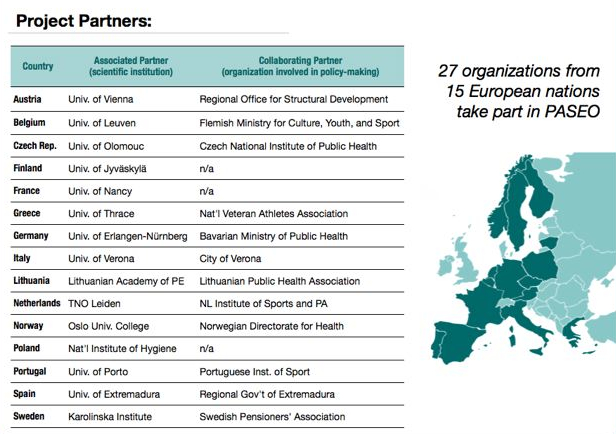PASEO
PASEO – Building political capacity to promote health through physical activity among inactive older people
In recent years, numerous programs have been developed to promote physical activity in older people. However, these programmes have so far been insufficiently used. The aim of the EU-funded PASEO project is to improve the implementation of programmes to promote physical activity among inactive older people by building the necessary political capacities.
Brief overview
Period: 2009-2011
Project coordinator: Prof. Dr. Alfred Rütten
Project staff: Dr. Peter Gelius
Sponsor: European Commission, DG Sanco
Building alliances
The focus of the PASEO project is on establishing national and regional alliances within the framework of which political capacities for the promotion of physical activity among inactive older people are to be developed. In each of the participating countries, a scientific partner and a governmental organization jointly establish an alliance.
Priorities
PASEO focuses on two priorities in policy capacity development:
- Intersectoral capacities, e.g. creation of networking structures between organisations from different sectors (e.g. health, sport, social affairs)
- Capacities within organisations, e.g. improvement of the personnel situation as well as competencies and cooperation within organisations.
Project process
The project has a duration of 30 months and is divided into four work packages.
- The partners will first assess the existing policy capacity to promote health through physical activity in inactive older people (work package 1).
- They then select suitable partners for an alliance and start building it (work package 2).
- An action plan for policy capacity development will be developed with the alliance partners (work package 3).
- The implementation of this action plan will be scientifically monitored by the partners (work package 4).
Action plan and Cooperative planning
The central element in building political capacity is a cooperative planning process to develop an action plan (work package 3). At six pre-structured meetings, possible measures are worked out with the alliance partners under the leadership of the government organisation involved and under the moderation of the scientific partner, e.g:
- Development of networking structures between different sectors, development of capacities within the participating organisations,
- Awareness-raising of political actors on the importance of political capacities to promote physical activity among inactive older people,
- Search for financing possibilities to implement the action plan,
- To ensure the continuity of the national alliances after the end of the project.
